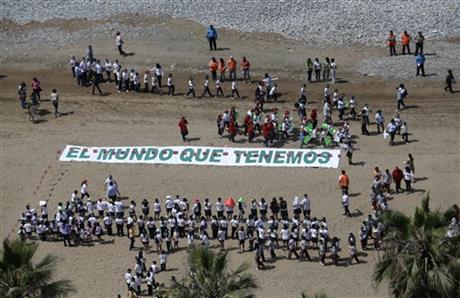
By LORI HINNANT
Low oil prices could paradoxically help the world reach an international agreement to fight global warming, according to the French ambassador charged with organizing a key climate conference in Paris.
France is spending the next 11 months trying to cajole more than 190 countries into overcoming disagreements about acceptable greenhouse gas emissions levels and who should pay to achieve them to produce a binding accord to limit emissions.
Laurence Tubiana, France’s special representative for the 2015 climate conference in Paris, says now nations can’t cite high energy prices as a reason to avoid taking action.
“Several years ago, I would have said it (low oil prices) complicates things,” she told The Associated Press in an interview this week. “(But) lower energy prices give more maneuvering room for investment and could ultimately allow the introduction of a carbon tax or something that works like one.”
In fact, she said, forward-looking governments will be able to use the money saved on oil and gas to develop renewable technologies, rather than increasing their fossil fuel extraction. And lower costs at the pump means consumers will be less opposed to new taxes to offset greenhouse gas emissions. Those taxes, sometimes called carbon taxes, have faced resistance in the United States, but many other countries have adopted some versions of them, using the proceeds to invest in renewable resources.
Still, the argument only carries so far — many environmentalists fear that low oil prices will simply let governments continue their reliance on greenhouse gas-emitting fossil fuels, while high prices could force them to look elsewhere for energy.
Oil prices have plunged by half since June. Benchmark U.S. crude fell $1.48 to $52.64 a barrel Wednesday on the New York Mercantile Exchange.
The ultimate goal of U.N. climate negotiations is to stabilize greenhouse gases at a level that keeps global warming below 2 degrees C (3.6 F), compared with pre-industrial times. For Tubiana, the key to reaching that goal is a legally binding agreement, one incorporated into law or national policy in every country in the world.
Negotiations culminating in the Nov. 30-Dec. 11 meeting in Paris will rise or fall on two key points: How to divide responsibility for global warming and how to pay to fight it. The developed world used fossil fuels to build roads, cities and houses and emerging economies want to have the same chances to grow as quickly as possible. Island nations like Tuvalu and low-lying countries, meanwhile, fear rising sea levels will swamp them and need funds to adjust.
But, Tubiana said, one set of rules must apply to everyone. And ultimately, low oil prices or not, fossil fuels have to be phased out.
“We have to change the trajectory of development for all countries, rich or poor,” she said. “It is out of the question to pass through a phase of intensive fossil fuel use, then lowering it.”
Crucially — and potentially most difficult — she said the accord must be legally binding.
“Otherwise governments can say today they want something, then in three or four years, they can change their minds,” she said.
That could prove complicated in the United States, where Congress voted down climate legislation in 2009. President Barack Obama has largely leaned on existing laws to make progress, raising vehicle fuel standards for trucks and proposing stricter controls on power plants but he will leave office in January 2017.
The U.S. and China, the world’s two largest emitters of heat-trapping gases, negotiated secretly for months in 2014 to reach a non-binding climate change agreement but momentum from that deal disintegrated at a conference in Lima, Peru, where a compromise deal was salvaged in December to set up the Paris accord.
In Lima, China and other major developing countries opposed plans that would allow pledges to be compared against one another before the Paris meeting.
Still, Tubiana was encouraged by some progress in Lima.
“Every country has agreed to make a contribution. That is very important,” she said.



